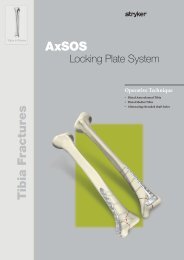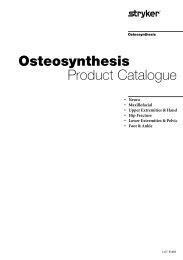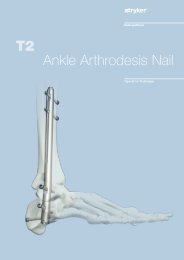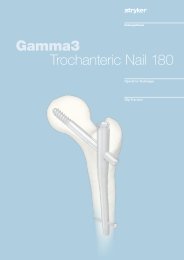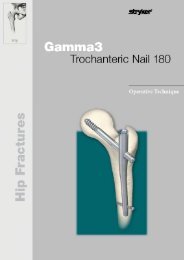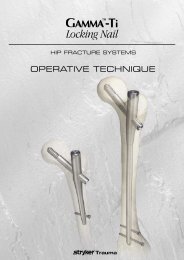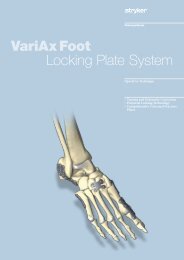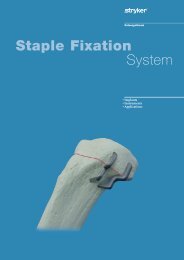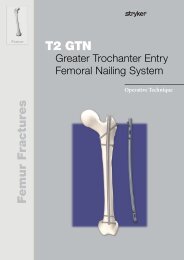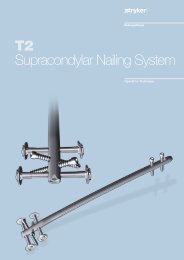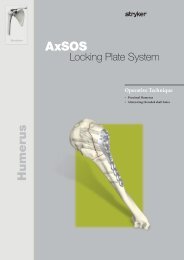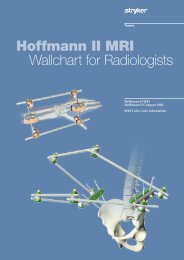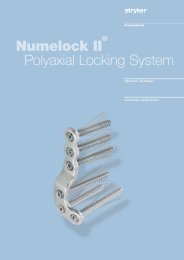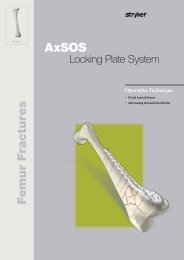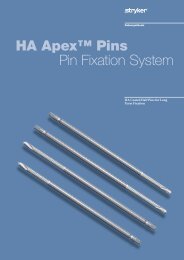T2 Humeral Nailing System Operative Technique - Stryker
T2 Humeral Nailing System Operative Technique - Stryker
T2 Humeral Nailing System Operative Technique - Stryker
You also want an ePaper? Increase the reach of your titles
YUMPU automatically turns print PDFs into web optimized ePapers that Google loves.
Ordering Information – Instruments<br />
Bixcut<br />
Typical Standard<br />
Reamer Ø14mm<br />
C le a r a nc e a re a :<br />
32% of cross section<br />
Bixcut<br />
Reamer Ø14mm<br />
Clearance area :<br />
59% of cross section<br />
Bixcut<br />
49<br />
Complete range of modular and<br />
fixed-head reamers to match<br />
surgeon preference and optimize<br />
O. R. efficiency, presented in fully<br />
sterilizable cases.<br />
Large clearance rate resulting from reduced number<br />
of reamer blades coupled with reduced length of<br />
reamer head to allow for effective relief of pressure<br />
and efficient removal of material 3 .<br />
Cutting flute geometry optimized to lower pressure<br />
generation 3 .<br />
Forward- and side-cutting face combination produces<br />
efficient material removal and rapid clearance 3 .<br />
Double-wound shaft transmits torque effectively and<br />
with high reliability. Low-friction surface finish aids<br />
rapid debris clearance 3 .<br />
Smaller, 6 and 8mm shaft diameters are designed to<br />
reduce IM pressure.<br />
Studies 1 have demonstrated that<br />
the pressures developed within<br />
the medullary cavity through the<br />
introduction of unreamed IMnails can<br />
be far greater than those devel oped<br />
during reaming − but this depends<br />
very much upon the design of the<br />
reamer.<br />
After a three year development study 2<br />
involving several universities, the<br />
factors that determine the pressures<br />
and temperatures developed during<br />
reaming were clearly established.<br />
These factors were applied to the de -<br />
velopment of advanced reamers that<br />
demonstrate significantly better per -<br />
form ance than the best of previous<br />
designs 3.<br />
1 Jan Paul M. Frolke, et al. ;<br />
Intramedullary Pressure in Reamed Femoral<br />
<strong>Nailing</strong> with Two Different Reamer Designs.,<br />
Eur. J. of Trauma, 2001 #5<br />
2 Medhi Moussavi, et al.;<br />
Pressure Changes During Reaming with Different<br />
Parameters and Reamer Designs,<br />
Clinical Orthopaedics and Related Research<br />
Number 373, pp. 295-303, 2000<br />
3 Andreas Speitling;<br />
Intramedullary Reamers, commented slides of<br />
internal test report, Sep 1999



